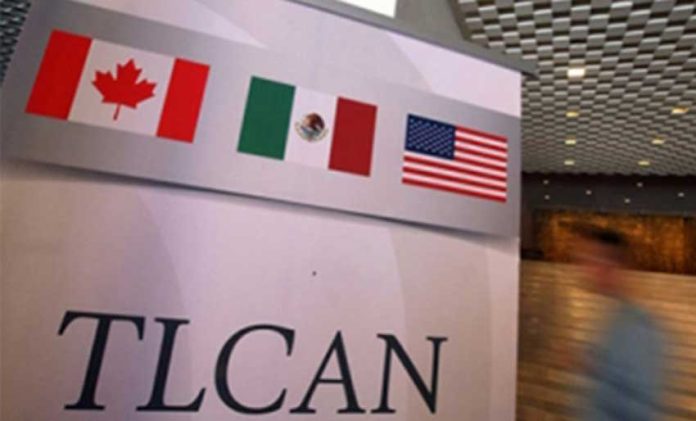Mexican and Canadian officials insisted yesterday that the North American Free Trade Agreement (NAFTA) remain a three-way pact as speculation continues that the United States will seek separate trade deals with its two neighbors.
After a meeting in Mexico City, Economy Secretary Ildefonso Guajardo and Canadian Foreign Minister Chrystia Freeland said they were still optimistic that an agreement to update the 24-year-old treaty can be reached.
They also reiterated their opposition to the so-called sunset clause that the United States has been pushing for, which would see NAFTA automatically terminated if the three countries don’t renegotiate the deal after five years.
Trilateral trade discussions started last August and were originally scheduled to conclude by the end of 2017 but have dragged on due to differences on key issues such as rules of origin for the automotive sector.
In the lead-up to Mexico’s presidential election, the talks stalled again amid increased trade tension arising from the United States decision to impose tariffs on Mexican and Canadian steel and aluminum.
During the drawn-out negotiation process, United States President Donald Trump has repeatedly threatened to pull out of NAFTA if a deal that better favors the U.S. is not reached.
Last month, he said that two separate trade deals with Mexico and the United States could replace the trilateral agreement and floated the idea again last week.
However, in a letter to president-elect Andrés Manuel López Obrador dated July 20 Trump wrote: “I believe a successful renegotiation of the North American Free Trade Agreement will lead to even more jobs and higher wages for hard-working American and Mexican workers — but only if it can go quickly.”
He continued, “otherwise I must go a much different route,” adding “it would not be my preference, but would be far more profitable for the United States and its taxpayers.”
Trump’s missive came in response to a letter sent earlier this month by AMLO, as the 64-year-old president-elect is known, in which he wrote he wanted to maintain a three-way NAFTA and called for a swift conclusion to negotiations.
United States Secretary of Agriculture Sonny Perdue yesterday raised the prospect that the U.S. could seek separate deals, and that an agreement with Mexico could come first, in September.
But Guajardo — who traveled to Washington D.C. today with Foreign Secretary Luis Videgaray and AMLO’s prospective chief NAFTA negotiator Jesús Seade to resume talks with U.S. Trade Representative Robert Lighthizer — stressed that the goal was to maintain a three-way pact.
“The fact that we are going to Washington to participate in bilateral talks is to reinforce the concept of the trilateralism of this agreement,” he said. “The essence of this agreement is trilateral, and it will continue being trilateral.”
Mexico’s next foreign secretary, Marcelo Ebrard, also expressed support for NAFTA to remain a trilateral treaty.
“It should and can be modernized but we’re not thinking about it having a different nature to that of today,” Ebrard said, speaking outside López Obrador’s transition headquarters after the president-elect met with Freeland.
At that meeting, AMLO personally told Freeland he supported a trilateral trade treaty and also proposed that Canada increase its investment in Mexico in order to contribute to the country’s economic development.
Specifically, the president-elect invited the government of Canada to participate in the Cancún-Palenque train project and the development of the Isthmus of Tehuantepec region, Ebrard said.
The prospective foreign affairs secretary also said that López Obrador and Freeland agreed to widen cooperation between Mexico and Canada in areas such as the aerospace industry and transportation logistics.
While the communication channels between the three countries are open, some analysts believe that a deal remains unlikely in the short term in contrast to Guajardo who said last week a new agreement could come as soon as next month.
“It’s hard to see an agreement in August without the U.S. falling off some of its positions,” said Bill Reinsch, senior adviser at the Center for Strategic and International Studies.
Eric Miller, a former Canadian diplomat who is now a Washington-based trade consultant, said the White House’s NAFTA strategy to conquer and divide through hardline tactics such as the imposition of tariffs and now the proposal to negotiate separate deals is nothing new.
“The NAFTA negotiations appear to be repeating the same pattern that they have followed since the beginning: the United States sets unrealistic deadlines and tries to pressure their counterparts into a deal,’’ he said.
Source: Reuters (en), El Universal (sp), El Financiero (sp)
